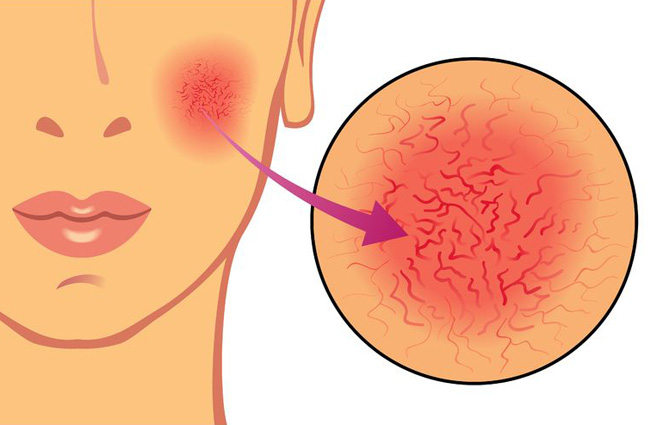In this article I look at considerations both in the causes of rosacea and also natural therapies to help address rosacea including dietary, testing and supplemental considerations.
I have come across rosacea in clients a number of times and the triggers from one individual to another are often very different, however there are some common areas that I look to address when this is a primary goal or someone presents with rosacea.
Rosacea is commonly known as acne rosacea and as with all skin conditions I tend to heighten my interest in other areas of health such as immune and digestive function and also looking at lifestyle factors such as diet and stress.
Acne rosacea differs from normal acne in that it is vascular in nature and not related to keratin levels and sebum production. Likewise whereas normal acne is more common throughout puberty, acne rosacea is more common in adulthood and more prevalent in females than it is in males.
There are 3 main stages of rosacea which I am not going to go into, but essentially the stages refer to the severity of the condition and symptoms.
What can causes of Rosacea?
Helicobacter pylori (H.Pylori)
This is a common pathogenic bacterium. Research indicates that it can play a direct role in the susceptibility for rosacea and as the infection severity increases so does the symptoms of rosacea. One study showed that in around 50% of rosacea cases H.Pylori was present and in another study as much as 84% tested positive for H.Pylori.
Certain strains of H.Pylori produce a specific inflammatory effect that increases the likelihood of rosacea. Fortunately with the development in stool testing technology over the past 5-10 years we are now able to look specificly for the strains of H.Pylori that have the virulence factor CagA that has been associated with rosacea.
Interestingly with the eradication of H.Pylori one study showed a 95+ percent success rate at eliminating acne rosacea (51 of 53 individuals).
As well as H.Pylori I believe it is important to also rule out any other type of bacteria imbalance or infection that might be contributing to inflammation within the body as H.Pylori is rarely a lone ranger.
Small Intestine Bacterial Overgrowth (SIBO)
Addressing small intestine bacteria overgrowth has also been shown to result in significant improvement in rosacea.
Low stomach acid and pancreatic enzyme production
We require adequate levels of stomach acid to help us breakdown our food, sterilize the food we do eat and to also keep the rest of the digestive system in balance.
Factors such as high stress, worry, common nutrient insufficiencies like zinc can all contribute to lowered stomach acid levels.
Low pancreatic enzyme function is also associated with rosacea, in particular the fat splitting enzyme lipase. Given that it is important to look for any signs of intolerances to higher fat foods such as nausea, loose stools, anal leakage etc.
In some cases HCl and pancreatic enzyme supplementation may be necessary. I would also encourage focus on mindful eating and review eating habits, such as eating under stress, standing, on the move, eating quickly, lack of chewing, negative thoughts when eating etc.
Diet
One of the most common triggers of rosacea is alcohol, as well as that; food sensitivities may also play a role. If food sensitivities are playing a role then reviewing overall gut health is important, as permeability of the intestinal wall (leaky gut) may be present. Whether food sensitivities are a cause of leaky gut or a result of it is hard to say, irrespective it can be a vicious cycle.
When this occurs foods and other toxins are able to cross the intestinal barrier and can induce inflammatory and immune responses in the blood that may exacerbate rosacea.
Foods & Drinks that are most likely to cause symptoms include:
- Alcohol
- Coffee
- Refined and process carbohydrates – grains and sugars
- Spicy foods
- Refined and process oils such as vegetable and seed oils, especially margarine
- Dairy
As you can see it is the usual suspects and this is why maintaining a consistent wholefood, non-processed diet is the foundation for any skin health related nutrition plan.
Nutrient issues
Low levels of certain B vitamins have been associated, however in some cases B vitamin supplementation appears to exacerbate the symptoms. It is hard to say whether the vitamin supplementation itself was causing the issue, as there is always an extreme variability in the quality of nutrients used.
If testing demonstrates a need for B vitamins then supplementation may be of benefit and in those cases introduction of supplementation can occur whilst keeping a symptom diary and gradually titrating the dosage up.
For B vitamin testing I tend to use a combination of blood tests and urine testing. This gives me the best overview of actual levels and also functional need for B vitamins.
Alongside magnesium I would say zinc is one of the most common nutrient insufficiencies. Standard blood chemistries and direct tests either through serum with copper or red blood cell zinc alone measurements give a good idea of zinc status.
Authors have concluded that zinc is a potential treatment option for rosacea. Optimising zinc has the potential to help with optimising hydrochloric acid levels as well, as zinc is crucial in the production of hydrochloric acid amongst hundreds of other biochemical processes.
How you can improve Rosacea
Create a good anti-inflammatory diet, eliminating known foods that cause you issues and following the below basic guidelines:
- Plenty of veg
- Good protein intake with 2-3 meals in the day
- Good fats with all meals and snacks
- Non processed carbohydrates
- Adopt a gluten free diet
- Eliminate alcohol and caffeine
- Eliminate all processed and highly refined oils
- Eliminate dairy
Consider testing
- Comprehensive stool test
- Urine organic acids with dysbiosis markers
- SIBO hydrogen & Methane breath test
- Comprehensive blood chemistry with vitamin D
The results of the above testing may dictate your next move. Even before testing though, foundational food and lifestyle changes are crucial and in a large majority of the cases will bring about significant improvements in rosacea or even a complete resolution in symptoms.
I hope you found this article useful and welcome any comments or feedback. We are of course all individual and in some people a more individualised approach is necessary. For those interested in 1-2-1 consultations please feel free to contact me using the form below.
Contact Steve Grant Health
To learn more out how Steve Grant Health can assist you on your journey, please fill out the enquiry form below.
Please note that depending on your specific circumstances and goals, Steve may recommend that you work with one of the specialist practitioners within his network of trusted professionals.
If you have been referred by a clinician, please complete the form and ensure that you state who has referred you or have your practitioner email Steve direct to make a referral that way.
Click the button below to open the client enquiry form:
[widgetkit id=”643″]















